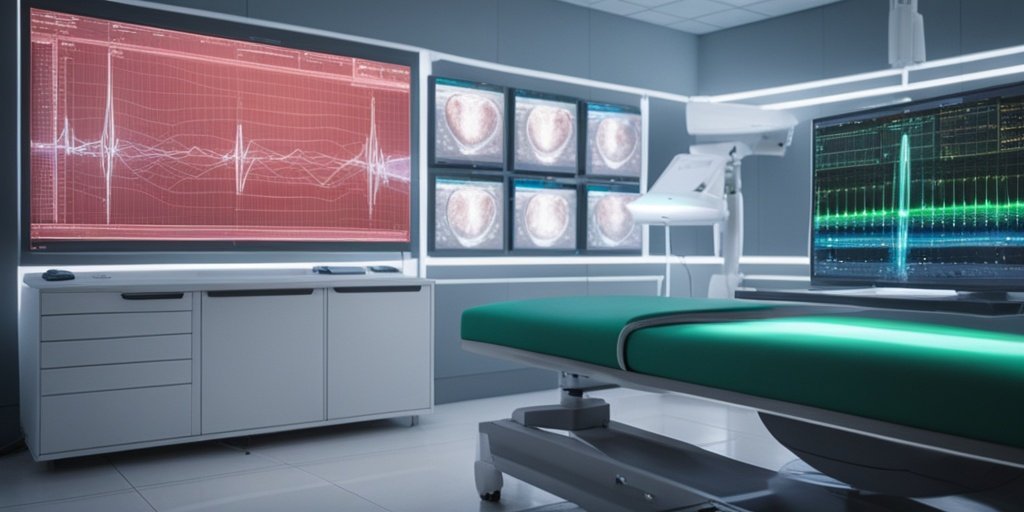⚡ Quick Summary
This study explored the use of deep learning (DL) models to identify severe coronary stenosis in patients with apparently normal electrocardiograms (ECGs). The best-performing model achieved an AUC of 0.847, demonstrating the potential of DL in enhancing routine cardiac screenings.
🔍 Key Details
- 📊 Dataset: 392 patients, including 138 with severe stenosis
- 🧩 Features used: ECG data and clinical information (age, sex, hypertension, diabetes, dyslipidemia, smoking status)
- ⚙️ Technology: Deep learning models (trained from scratch and via transfer learning)
- 🏆 Performance: Best model: AUC 0.847, Sensitivity 84.8%, Specificity 70.4%
🔑 Key Takeaways
- 💡 Deep learning can effectively identify severe coronary stenosis in patients with normal ECGs.
- 📈 Combining ECG data with clinical information significantly improves sensitivity.
- 🔍 Transfer learning techniques enhance model performance with lower computational costs.
- 🏥 The study highlights the importance of advanced screening methods in cardiology.
- 🌍 Potential for broader applications in routine cardiac assessments and early detection of heart disease.
- 🧠 The study was published in BMC Medical Informatics and Decision Making.
- 📅 Publication Date: 2024

📚 Background
Detecting severe coronary artery stenosis can be challenging, especially when patients present with normal ECGs. This situation often leads to missed opportunities for timely intervention, which is critical for preventing adverse cardiovascular events. The integration of advanced technologies, such as deep learning, into routine screenings could significantly enhance diagnostic accuracy and patient outcomes.
🗒️ Study
The study involved a cohort of 392 patients, with a focus on developing a model capable of distinguishing between severe and mild or no coronary stenosis based solely on ECG data. Researchers employed both scratch-trained and transfer learning deep learning models, evaluating their performance against clinical data to determine the most effective approach.
📈 Results
The results indicated that the DL models trained from scratch using only ECG data achieved a specificity of 74.6% but had a low sensitivity of 54.5%. However, when clinical information was added, sensitivity improved to 90.9%, albeit at the cost of specificity, which dropped to 42.3%. The optimal performance was observed with the combination of clinical data and the transfer learning model, yielding an AUC of 0.847, with 84.8% sensitivity and 70.4% specificity.
🌍 Impact and Implications
The findings from this study underscore the transformative potential of deep learning in the field of cardiology. By improving the detection of severe coronary stenosis in patients with normal ECGs, healthcare providers can enhance early intervention strategies, ultimately leading to better patient outcomes. This research paves the way for integrating advanced AI technologies into routine cardiac assessments, potentially revolutionizing how we approach heart disease screening.
🔮 Conclusion
This study highlights the significant role of deep learning in identifying severe coronary stenosis, particularly in patients with normal ECGs. The successful application of transfer learning techniques demonstrates a promising avenue for improving diagnostic accuracy in cardiology. As we continue to explore the intersection of technology and healthcare, the future looks bright for enhanced patient care and outcomes.
💬 Your comments
What are your thoughts on the use of deep learning in cardiac screenings? We would love to hear your insights! 💬 Share your comments below or connect with us on social media:
Screening for severe coronary stenosis in patients with apparently normal electrocardiograms based on deep learning.
Abstract
BACKGROUND: Patients with severe coronary arterystenosis may present with apparently normal electrocardiograms (ECGs), making it difficult to detect adverse health conditions during routine screenings or physical examinations. Consequently, these patients might miss the optimal window for treatment.
METHODS: We aimed to develop an effective model to distinguish severe coronary stenosis from no or mild coronary stenosis in patients with apparently normal ECGs. A total of 392 patients, including 138 with severe stenosis, were selected for the study. Deep learning (DL) models were trained from scratch and using pre-trained parameters via transfer learning. These models were evaluated based on ECG data alone and in combination with clinical information, including age, sex, hypertension, diabetes, dyslipidemia and smoking status.
RESULTS: We found that DL models trained from scratch using ECG data alone achieved a specificity of 74.6% but exhibited low sensitivity (54.5%), comparable to the performance of logistic regression using clinical data. Adding clinical information to the ECG DL model trained from scratch improved sensitivity (90.9%) but reduced specificity (42.3%). The best performance was achieved by combining clinical information with the ECG transfer learning model, resulting in an area under the receiver operating characteristic curve (AUC) of 0.847, with 84.8% sensitivity and 70.4% specificity.
CONCLUSIONS: The findings demonstrate the effectiveness of DL models in identifying severe coronary stenosis in patients with apparently normal ECGs and validate an efficient approach utilizing existing ECG models. By employing transfer learning techniques, we can extract “deep features” that summarize the inherent information of ECGs with relatively low computational expense.
Author: [‘Xue Z’, ‘Geng S’, ‘Guo S’, ‘Mu G’, ‘Yu B’, ‘Wang P’, ‘Hu S’, ‘Zhang D’, ‘Xu W’, ‘Liu Y’, ‘Yang L’, ‘Tao H’, ‘Hong S’, ‘Chen K’]
Journal: BMC Med Inform Decis Mak
Citation: Xue Z, et al. Screening for severe coronary stenosis in patients with apparently normal electrocardiograms based on deep learning. Screening for severe coronary stenosis in patients with apparently normal electrocardiograms based on deep learning. 2024; 24:355. doi: 10.1186/s12911-024-02764-0